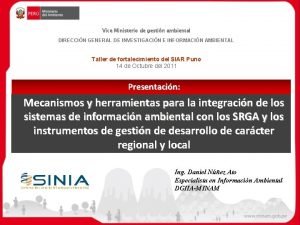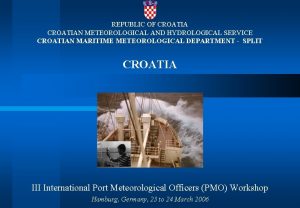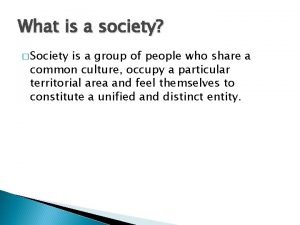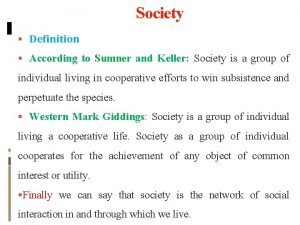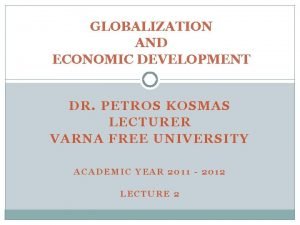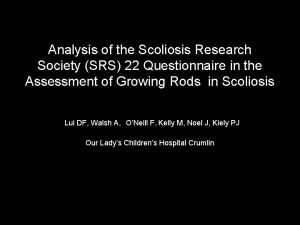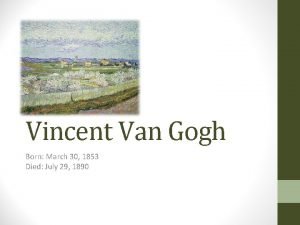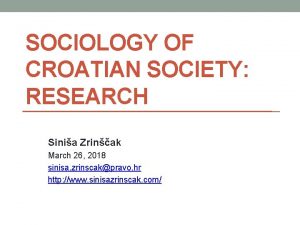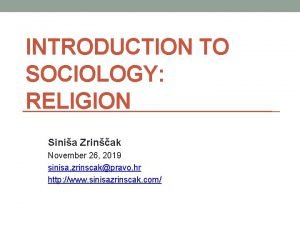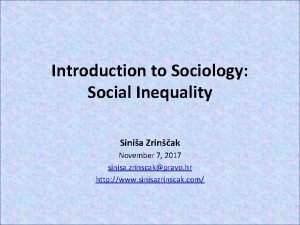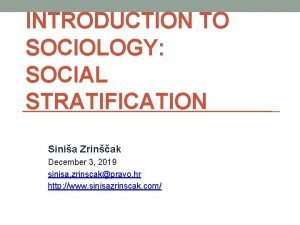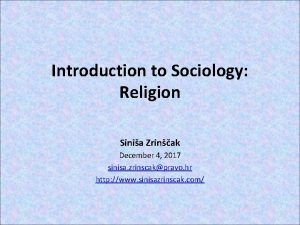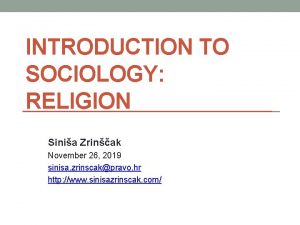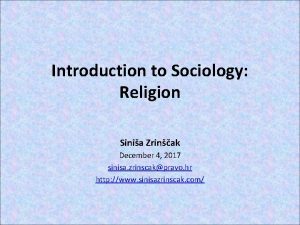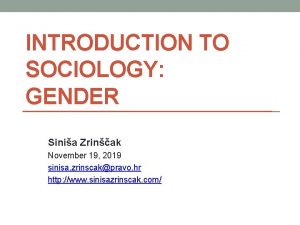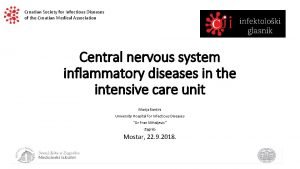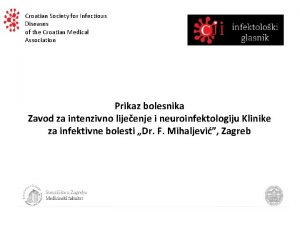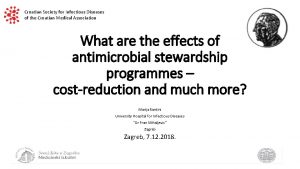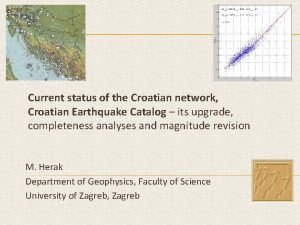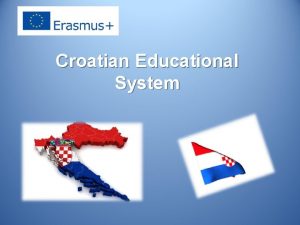SOCIOLOGY OF CROATIAN SOCIETY RESEARCH Sinia Zrinak March




















- Slides: 20

SOCIOLOGY OF CROATIAN SOCIETY: RESEARCH Siniša Zrinščak March 26, 2018 sinisa. zrinscak@pravo. hr http: //www. sinisazrinscak. com/

• Sociology – systematic study of the ways in which people are affected by, and affect, the social structures and social processes that are associated with the groups, organizations, cultures, societies, and world in which they exist • …so, how to do that? Researching people / social? • Scientific method – structured way of finding answers to question about the world • Scientific way of revealing truth # other ways (common sense)

How to make a science? • 1. Questions to be answered • 2. Reviewing the literature • 3. Formulating hypothesis – educated guesses • 4. Choosing method(s) • 5. Collecting data / fieldwork • 6. Analysing data • 7. Confirming / rejecting hypothesis, building a theory …

• How to build on existing knowledge? Larger theories that inform / channel much of the research? • T. Kuhn – paradigm – general model of the world, accepted by most practitioners in the field – geocentric and then, breaking the old and building the new one – heliocentric • Sociology – multi-paradigm science • E. g. – secularization # religious vitality # religious change … • Constant work on understanding data / societies

Methods • How to choose a method? • From understanding which method(s) work(s) best to the resource issues • Quantitative – numerical data which are analysed by statistics – investigation of larger groups, representative samples • Qualitative – in-depth data – not require / possible to be analysed by statistics – in-depth understanding of particular social process – but small size, not generalized to broader population

Observation • - systematically watching, listening and recording that takes place in a natural social settings • Good insights, particularly for subjects / issues we lack much of knowledge • Key issues • - if those observed are aware of that (ethical issues) • - if those observed change their behaviour (presence of themselves, „use” of observant, who are key informants. . ) • - degree to which the process is structured • Types: • - Participant and Nonparticipant

Ethnography • Systematic study of people and culture – what a group of people do and the way they live – associated with anthropology • - use of ethnographic study in sociology (Durkheim) • Global ethnography (Burawoy) – understandings of globalization from the point of view how it exists in their lives

Interviews • Respondents answer to the series of questions • Types: • - pre-structured – definitive / preselected answers – easy to be analysed • Face-to-face, phone, web… • Willingness for answering, need to avoid reaction to answers, need for additional explanation which might change the understandings … • - semi-structured / non-structured – general questions to be answered

• Issues: • - how to gain access to interviewees • - how to locate key informants – particularly in sensitive issues • - understanding of the language and culture of people being interviewed • - establishing trust; how to guarantee anonymity

Survey research • Collection of information from a population or a representative portion of population – use of interviews / questionnaires • Descriptive – collection of information about people in a specific location, group. . (from Census to small descriptive research) • Explorative – to understand causes – by analysing social background, attitudes… • Do we believe in survey results? And why? E. g. – pre- election surveys?

• Sampling! • Random sample – everyone has and equal chance to be included – certain characteristics are equally distributed • Stratified – division in subgroups and than random from each group • Mistake – Literally Digest survey before Presidential election in the USA in 1936 – based on 2. 4 millions of respondents, the prediction was Roosevelt (41%) and Landon (55%), while Roosevelt won with 60%! It was not about the size of sample but its representativeness • Convenience sample – many Internet surveys today!!

Experiments • Independent – dependant variables • Experiment – manipulation of independent variable to observe affects on dependant • Types • Laboratory – in laboratory, complete manipulation of independent variable • S. Asch – on conformity • - limitations in sociology • Field – in natural settings, some control over independent variables

• E. g. – who has more chances to be employed: • - Emily and Greg or Lakisha and Jamal in the USA (Bertrand Mullainathan 2014) • - Ivan Lučić or Vojislav Trifunović in Zagreb (Maslić Seršić and Vukelić 2012)

Secondary data analysis • Re-analysing data collected by others (e. g. by governments and other administrative bodies, or INGOs, or other sociologists. . )

Historical-comparative method • Comparing histories about more societies, or components of societies, to analyse trends, finding similarities and differences in social outcomes… • Weber – Comparative research on religion and outcomes – Capitalism or not! • Why and how Protestantism (Calvinism) is associated with Capitalism

Content analysis • Systematic analysis of the content of cultural artefacts in print, visual, audio and digital media – both quantitative and qualitative • Example – content analysis of two Catholic weeklies in Croatia and Italy on refugees and migrants • + analysis based on semi-structured interviews • e. g. : G. Giordan, S. Zrinščak (2018) One pope, two churches: Refugees, human rights and religion in Croatia and Italy. Social Compass, 65(1): 62 -78.

Comparing Croatia and Italy Croatia Italy • Background (Refugees • Background (Migrations • “Glas koncila” (“The • “La difesa del popolo” crisis 2015/2016) voice of the Council”), jointly published by five Arch-dioceses, four from Croatia and one from Bosnia and Herzegovina • 301 articles emergences) (“The defense of the people”), published by the Diocese of Padua • 219 articles

Content Analysis weekly newspapers Topics (key words in articles; more than one per article; %) Croatia Italy Refugees/refugee wave 87 58 Migrants/migrant wave 49. 8 98. 6 Syrians 24. 5 8. 7 Iraqi 7. 3 0. 9 Afghans 5. 9 0. 9 Economic migrants 2. 6 8. 2

Content Analysis weekly newspapers Assessment of author’s main attitude toward migrants/refugees (%) Croatia Italy Positive 21 41. 5 Neutral 73 58. 5 Negative 5 0 Assessment of the general attitude of the Croatia article toward migrants/refugees (%) Italy Affirmative 44 47. 5 Ambivalent 48 52. 5 Negative 9 0

Content analysis Weekly newspapers and interviews Croatia • Migration wave as a „natural • • disaster” Humanitarian approach – „we are humans who see humans in needs in front of us” „Close transit system” = nonvisibility of migrants HR approach downplayed Questionable long-term consequences for Europe, and consequently for Croatia Italy • Positivity of an intercultural • • • society Importance of interreligious dialogue Immigrants not just people in need, but people with rights Rights of citizenship to those born in Italy It is not an emergency anymore: it is the normal situation in a moving world We need immigrants for demographic reasons (welfare sustainability)
 Que es la sinia
Que es la sinia Que es la sinia
Que es la sinia Croatian forest research institute
Croatian forest research institute Poland national anthem lyrics
Poland national anthem lyrics Croatian meteorological and hydrological service
Croatian meteorological and hydrological service Croatian national animal
Croatian national animal Croatian sentence structure
Croatian sentence structure Croatian sentences
Croatian sentences Bononote
Bononote Croatian christmas traditions
Croatian christmas traditions Proning zagreb
Proning zagreb What is the relationship between the society and culture
What is the relationship between the society and culture Sumner and keller
Sumner and keller Features of industrial society
Features of industrial society Gertler econ
Gertler econ What is field research in sociology
What is field research in sociology Society of clinical research associates
Society of clinical research associates Scoliosis research society
Scoliosis research society Society for disease control and research
Society for disease control and research Grihalakshmi magazine march 2019
Grihalakshmi magazine march 2019 When was van gogh born
When was van gogh born
